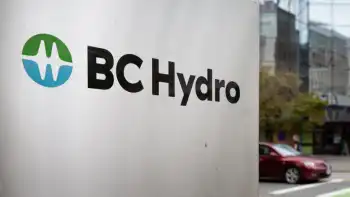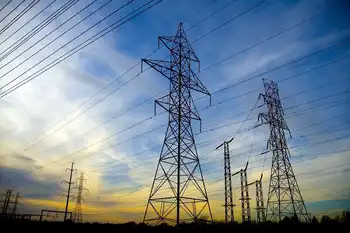By Sacramento Bee
Electrical Testing & Commissioning of Power Systems
Our customized live online or in‑person group training can be delivered to your staff at your location.

- Live Online
- 12 hours Instructor-led
- Group Training Available
The Federal Energy Regulatory Commission also launched formal investigations of five energy companies suspected of manipulating electricity prices and indicated it may target their corporate profits for repayments. And it again asked Congress for more authority to punish abusers.
The actions, outlined in a long-awaited status report to Congress, represent some of the strongest steps FERC has taken in months to address California's complaints about runaway power prices in 2000 and 2001.
The report was dismissed by Gov. Gray Davis as a "whitewash" but was greeted far more optimistically by consumer advocates and even some within the Davis administration.
"I am certainly pleasantly surprised. If they really carry through on what they're suggesting, it's one of the biggest breakthroughs in this whole sad story," said Mike Florio, a consumer attorney who also sits on the board of the state's electric grid operator.
FERC characterized the report as tough on market manipulators.
"It says there is no place to hide. If you engaged in behavior that is at best inappropriate and at worst illegal, we're going to find you," said FERC Commissioner Nora Brownell.
Electricity generators and marketers were initially wary, fearing the prospect of larger refunds to California might complicate ongoing efforts to renegotiate long-term contracts with the state.
"I don't think this works for the sellers' advantage," said Gary Ackerman, head of the Western Power Trading Forum. "The industry is going to take this very seriously."
FERC also opened a new, deeper round of investigations and hearings into the actions of Enron Power Marketing Inc., Enron Capital and Trade Resources Corp., and Portland General Electric Co. -- all subsidiaries of the Houston-based Enron Corp. It also targeted Avista Corp. of Spokane, Wash., and El Paso Electric Co. of Texas, utilities it alleges helped Enron in its efforts to boost prices.
If the commission finds the companies violated federal law or FERC rules, it could revoke their ability to trade power on the open market and order them to make payments from profits.
All five companies said they were cooperating fully with FERC, and Avista added that it has acted "ethically and honestly" in its business practices.
The report to Congress summarizes the progress FERC has made since February, when Enron's bankruptcy filing in December prompted regulators to investigate the role the company played in Western power markets.
But the agency's effort broadened and picked up speed in May, after it received the infamous Enron memos describing "Fat Boy," "Get Shorty" and other colorfully named schemes to hike the wholesale prices.
The report concludes that Enron's trading strategies may have involved deceit and the submission of false information.
"Enron, as a corporate entity, displayed great eagerness to experiment with all aspects of the market rules and protocols in an effort to 'game the system' or to provide false information," it said.
While the report holds out the prospect of action against Enron affiliates and others, its 107 pages don't add much that Congress hasn't already explored.
Davis criticized the report for failing to announce sanctions or recommend prosecutions against any company and said FERC is dragging its heels on a state request for about $9 billion in refunds for market manipulation.
"FERC is impotent. FERC is anemic. FERC is spineless," the governor said.
Told of his remarks, Brownell said that while FERC is determined to halt market manipulation, "we do have due process. We do need to actually prove it."
The potentially biggest plus for California came in the call by commission staff to recalculate the formula that will be used to award any refunds to western power purchasers.
FERC officials said that if the commission does change the formula, California could be eligible for about $1 billion more in refunds.
Ongoing refund proceedings have whittled the $9 billion California once sought down to an estimated $1 billion to $2 billion, so the change could mean "quite a bit" to California, said Erik Saltmarsh, acting head of the state's electricity oversight board.
"I don't want to pretend by any stretch of the imagination that yep, FERC got it right," he said, but "it's clearly a movement toward the good."
FERC repeatedly has reined in power buyers' demands for refunds by excluding some time frames and some types of trades. In addition, in what Saltmarsh called "a billion dollar screw- up," it set a refund formula that used published prices of natural gas to help calculate how much electricity should have cost. Natural gas fuels many California power plants and its cost influences electricity prices.
But the refund formula should be junked, FERC staffers said, because industry publications that report spot prices could easily have been misled by the sellers and traders.
"Unscrupulous traders could manipulate natural gas price indexes in order to increase profitability of their electricity positions," the report said. It also noted that FERC has not been able to independently confirm those prices, which were 10 to 20 times higher than reported sales in nearby states.
At the same time it released the report, FERC issued an order asking for comment in the next 30 days on a proposed alternate pricing formula, based on what natural gas sold for at the production field, plus transportation costs.
The report's release does not end FERC's investigation. The commission said that other issues and players may be targeted as the probe continues.
A final report will include much more detail on how the markets were manipulated and will also explore allegations that Williams Co., a major natural gas supplier, attempted to manipulate natural gas prices throughout the West.











